Could Ukraine Be a Tombstone for Russian Power? Or for the Western Alliance?
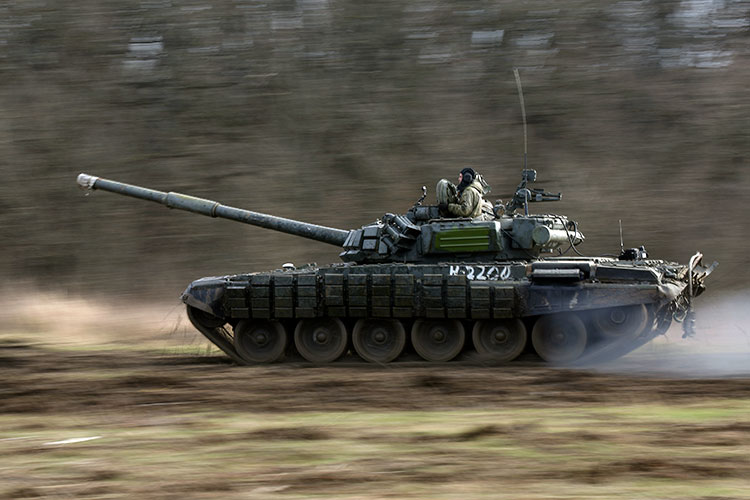
Russia is massing troops, tanks and material on its snowy borders with Ukraine, and the consensus among many Western observers is that President Vladimir Putin could launch a limited attack or full-scale invasion at any time. It would be the most significant military action in Europe since the end of World War II, and the outcome would be unpredictable.
But will he? That’s the great unknown, and as diplomats shuttle between capitals, Putin’s deliberately enigmatic posture has the world uncertain — and profoundly worried. Not only is there a risk of war, but the geopolitical chess match has implications for energy prices and the global economy, the security of Europe and the tense U.S. political climate.
Berkeley News talked with two veteran Russia scholars: George Breslauer and M. Steven Fish, both political scientists at UC Berkeley.
Based on their decades of research and experience with contemporary Russia, they offered compelling insights into the mind and heart of Russia’s leader: his immediate objectives in Ukraine and his overarching vision for Russia. They also reflected on the U.S. response to Putin’s military threat, the field of options for both sides, and possible long-term scenarios.
[The interviews, conducted separately, have been edited for length and clarity.]
Berkeley News: What are Vladimir Putin’s objectives in Ukraine?
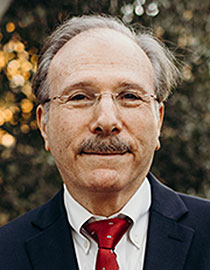
George Breslauer: This, for Putin, is analogous to the Cuban missile crisis.
What Putin has seen since 2015 — since the pro-Russian insurgency in eastern Ukraine and since Russia’s annexation of Crimea, is that the West was getting more and more deeply involved in upgrading Ukraine’s defense capability.
This is the point at which Putin drew the conclusion that he had to throw down a gauntlet to break this drift of Ukraine toward the West. … He has been saying this situation is not sustainable in Russia’s eyes, in his eyes, and if it takes a crisis to get you guys to the discussion stage, so be it.
It’s not reconstitution of the Soviet Union. It is simply saying, “In our neighborhood, we can allow independent states. But we can’t allow great powers to come in and turn those independent states against Russia, because that then becomes a national security threat to us.”

Steven Fish: Putin has always had two overriding goals: securing his own power and restoring Russia to what he sees as its rightful place as one of the world’s most secure and influential powers. He sees a sovereign Ukraine as a threat to both aims.
In order to sustain his legitimacy at home, Putin can’t count on the economy, which has been failing for a decade. Instead he relies on great power nationalism, and his stock was never higher at home than after he annexed Crimea and took over Donetsk and Luhansk in East Ukraine in 2014. Putin believes global greatness and clout, even more than a strong economy, are what make Russians happy and satisfied with their leaders.
Putin also can’t imagine Russia without what he calls its historic lands any more than Americans can imagine our country without New England and the Great Plains. Without them, there would be no America. And for Putin, without Ukraine, there can be no Russia.
He believes that as long as Ukraine runs its own political system and picks its own allies, it will pose an existential threat to Russia. In fact, just by existing as an independent state, Ukraine already does.
Do you think he’s actually going to invade Ukraine, or is this an exercise in brinksmanship in which he’s working toward other gains?
Fish: I think he is going in, though whether he’ll try to swallow Ukraine in one big gulp or in small sips over the course of years remains to be seen.
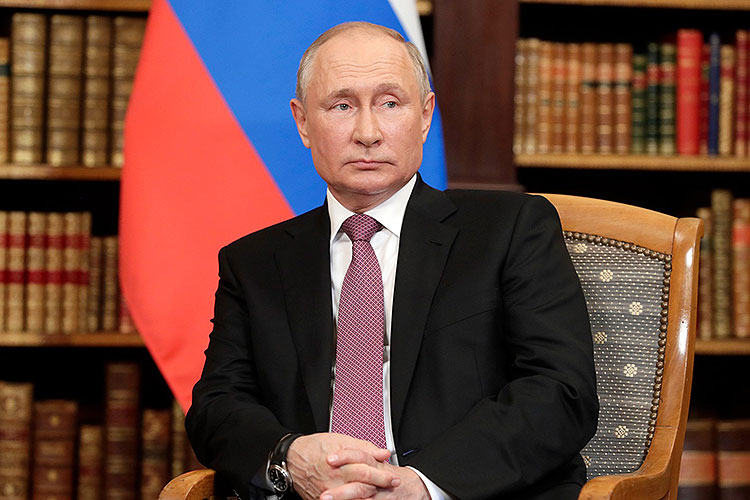
He’s tried everything else to bring Ukraine to heel. In 2004, he helped the then-president of Ukraine rig a presidential election to ensure a Russia-friendly successor, but Ukrainians rose up after the falsified contest and forced a rerun, which the West-friendly candidate won. He’s staged cyberattacks against Ukraine for the entire time he’s been in power.
In 2013, he offered Ukraine $20 billion to try to prevent it from entering the EU, and after the Putin-friendly president took him up on the offer, he was chased from office by a popular uprising. Then Putin annexed Crimea and took over parts of eastern Ukraine. Fourteen thousand dead and 1.5 million displaced Ukrainians later, Ukraine still hasn’t buckled.
Breslauer: I think Putin is willing to attack. The concept of invading brings to mind the Soviet Union’s invasion of Czechoslovakia in 1968 or Hungary in ‘56, where it was a matter of coming into the capital, toppling the government, putting in your own people and occupying the country. That would be so costly because it would invite a guerrilla war within Ukraine that would be unstoppable.
What I do see would be something analogous to what he did in Georgia in 2008, and that is to attack the Ukrainian military, probably with aircraft and drones and the like, in order to seriously deplete its capability. That would be sending a message to the Ukrainians: “If you want to go toe-to-toe with us, we will always be able to defeat you militarily.”
How would you assess the response so far from the administration of U.S. President Joe Biden?
Breslauer: It’s been contradictory. Biden made some comments in his press conference last week that suggested a certain weakening — in contrast to many of his diplomats who are out there being categorical that the Russian proposals are nonstarters, but let’s keep talking.
Depending upon what’s being said behind the scenes, Putin could interpret that as the U.S. saying, “To keep Russia from assaulting Ukraine, let’s just keep them talking.”
Russian diplomats are very sophisticated, and they would see through that quickly. Putin might then feel he has to do something in order to concentrate minds in the West that there is no military solution that is favorable to the West.
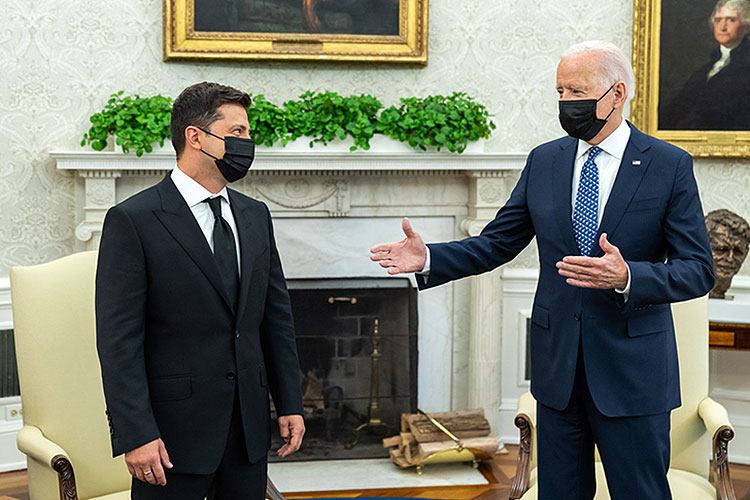
Fish: Biden muffed his treatment of the crisis in his recent press conference, but what matters is what he’s conveying to Putin in private. To give Putin pause, Biden must convince him that he is willing and able to threaten the two things Putin values most.
The first is his hold on power, and here, Biden has a built-in advantage. Putin has always believed that America has the means to take out his regime; the question is whether it’s willing to use them. Putin sincerely believes that all opposition activity in Russia and Ukraine, including the mass demonstrations that brought Putin-friendly governments down in Ukraine in 2005 and 2014, are orchestrated by the CIA. It’s nonsense, but Putin’s belief in America’s power to flip regimes at will hands Biden a potent tool.
The second thing is to credibly threaten Russia’s international power. The key here is making the cost of attack and occupation as high as possible for Putin. He knows that governing a country he’s destroying and whose population hates him won’t be easy, but it will be even harder if the United States aids the resistance with arms, intelligence and moral support.
Are there any viable military options that could be employed against Putin in the event of some kind of assault or invasion?
Breslauer: Most likely would be that we would resupply the Ukrainian military if their capacity was degraded. Least likely is that we would send troops or the air force.
Russia has escalation dominance in the region. Anything we can do, they can do better. They’ve got the troops, they’ve got the airplanes, etc. We don’t have either the will or the capability to stop them. Nor should we.
Somehow this is cracked up to be: If Russia gets its way, and Ukraine is no longer entertaining the prospect of NATO membership, that somehow we’ve abandoned Ukraine or abandoned Ukrainian people. I’d love to have Ukraine be a prosperous, democratic country — but when did it become a sacred mission of the United States to defend Ukrainian democracy?
Are there alternatives that find a middle road between military conflict and capitulation — and that provide a solution that everyone could live with?
Fish: Biden would have to do no more than what Putin already does to America and Ukraine: Flood Russian social media with material that aggravates social divisions and cultivates hostility toward the government. Entice some Russian oligarchs and officials who might be willing to turn on Putin with bribery and promises of safe haven. Back Putin’s opposition, both in Russia and among exiles who have fled his persecution. Counter Russia’s ongoing cyberwarfare with crippling cyberattacks of our own against Russia. Respond asymmetrically by pressuring Putin’s allies.
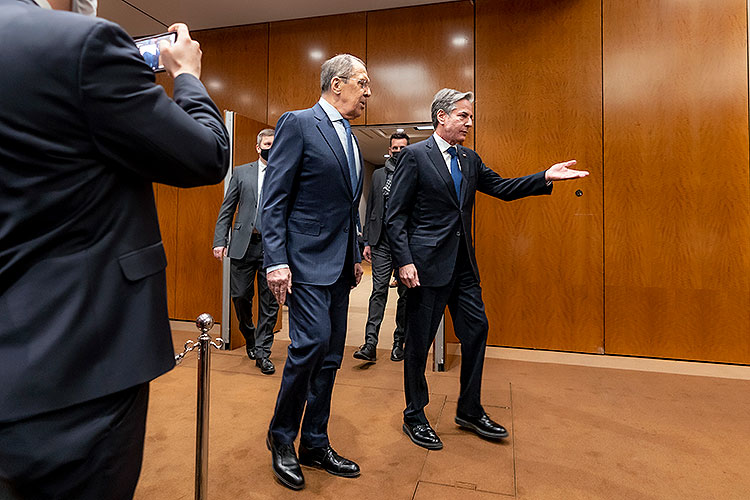
Breslauer: For 10 years after World War II, Austria was occupied by British, American and Russian troops, each having its own sector. With the Austrian State Treaty of 1955, there was an agreement among those powers that they would withdraw their troops, dissolve their sectors and let Austria engage in self-determination.
Austria could determine what type of political and economic system it would have, but not free to join NATO or the Warsaw Pact. Austria has been free and prosperous and neutral ever since.
If Russia, the United States, France and Germany, and conceivably Britain could agree upon the Austria solution for Ukraine, they would then have to impose it on Ukraine — it would be given no choice.
There’s been much discussion of alternative forms of conflict, short of military action. Could this approach be effective?
Fish: I think that the measures I mentioned could be, but only if they persist as long as attacks on Ukraine continue, even after Putin’s counter-sanctions bite.
Putin has reason to doubt America’s resolve. Even as he stokes racial hatred and anti-vax hysteria in American social media and even possibly tips a presidential election, Putin never faces consequences beyond targeted economic sanctions. Trump was more loyal to Putin than to America. Biden is a long-time Putin skeptic, but in dealing with the Russians and the Republicans alike, he projects more fear of provoking than determination to dominate.
If Biden doesn’t deal with Putin’s menace to democracies in Europe more aggressively than he’s confronting Trump’s menace to democracy at home, Putin will have little to fear.
How about financial sanctions? President Biden has threatened to impose crippling sanctions on Russia and powerful individuals in Russia.
Breslauer: If Biden cut Russia entirely from credit in the international banking system — the nuclear option — that would not lead Putin to cry “uncle.” We’ll find out whether it deters him from doing an assault on Ukraine, but I’ve always believed that Russians have lived with Western economic sanctions for a lot of years, and they’ve adapted to them.
It would be painful, but I don’t see Putin in his current state of mind as someone who’s going to say the national security threat to Russia is less important than avoiding the severest new economic sanctions.
I don’t think we can stop Russia from selling its oil and natural gas abroad. The price of oil and gas is pretty high these days, and Putin could use the money that he gets from those sales abroad to offset some of the economic dislocation caused by new, more severe Western sanctions.
Suppose there is some sort of military move against Ukraine, an invasion or something more limited. The West imposes sanctions, resupplies the Ukrainian military, maybe supports an insurgent force in Ukraine. What would the situation look like in a year?
Breslauer: It would probably be a slow, grinding conflict.
If the West does cut Russia entirely from credit in the international banking system, Putin would do some lashing out.
Assuming the Ukrainian government remains in place after this hypothetical Russian military assault, Russia could crash the government’s computer sites quite easily — it has done that over the last 20 years. That could make Ukraine virtually ungovernable. There’s also the threat of cutting off natural gas exports both to Ukraine and to countries in Western Europe that support the American position.
Fish: Ukraine could end up being the tombstone of either Russian power or the Western alliance. If Western and Ukrainian resistance succeeds, Putin could find himself with a restive population, burgeoning cemeteries, a depleted treasury, eroding global influence and no face-saving way out.
But if Putin succeeds in Ukraine, he will inevitably ratchet up pressure on the Baltic States and possibly other NATO members, such as Poland and Romania, and the United States is treaty-bound to treat an attack on these countries like an attack on America itself.
Given Russia’s geographical advantages and potential escalation dominance on NATO’s eastern flank, the POTUS could find himself either having to risk Washington to save Estonia or allowing the credibility of America’s security commitment to all NATO allies disintegrate.
